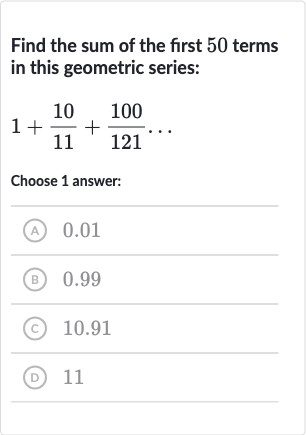Full solution
Q. Find the sum of the first terms in this geometric series:Choose answer:(A) .(B) .(C) (D)
- Identifying the series: We are given a geometric series:First, we need to identify the first term () and the common ratio () of the series.The first term is clearly .To find the common ratio , we divide the second term by the first term:
- Finding the common ratio: Now that we have the first term and the common ratio , we can use the formula for the sum of the first terms of a geometric series:, where is the sum of the first terms.We want to find the sum of the first terms, so .
- Using the formula for the sum: Let's plug the values into the formula:
- Plugging in the values: Simplify the denominator:So,
- Simplifying the denominator: Now, we multiply both the numerator and the denominator by to simplify the fraction:
- Multiplying by : We can now calculate , but since this is a very small number (because is less than and we are raising it to the power), it will have a negligible effect on the sum. Therefore, we can approximate the sum by ignoring this term:
- Approximating the sum: The sum of the first terms in the given geometric series is approximately .

